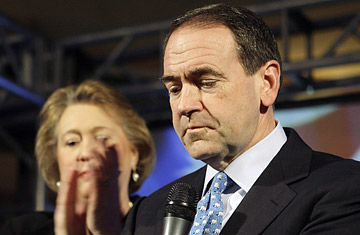
Mike Huckabee drops out of the Republican presidential race on March 4, 2008, in Irving, Texas.
(2 of 2)
"I can't think of anything that would more prove that the American dream was alive and well than if the folks from Iowa can give this kid from Arkansas a chance to lead this country," he told a crowd in Coralville at one event. "You will restore the faith of a lot of people in this country that you can't buy the White House, that you got to earn it the old-fashioned way."
What Huckabee lacked in resources he more than made up for in showmanship, including campaign tours with actor Chuck Norris and professional wrestler Ric Flair. In a Republican field of awkward campaigners, Huckabee shined as a rare politician who mastered the art of oratory. His style, filled with emotion and alliteration, followed the rolling pace of a Baptist preacher, his former profession. When he talked about Washington politicians, he spoke of "civilians in suits and silk ties." When he mentioned the military, he spoke of "generals with mud and blood on their boots." He railed against the "Washington-to-Wall Street power axis," and said a President is "not elected to the ruling class but to the servant class." He could weave the story of his son cooking a cake with too much salt into a parable about the perils of gay marriage. He could perfectly capture the struggles of Mitt Romney's campaign with a joke about expensive dog food. The punch line: "The dogs won't eat the darn stuff."
The rhetorical flourishes were often so good that they papered over his actual positions, which remained under-defined in many areas. On social issues, he was far more conservative than his rhetoric often implied: He disapproved of gay adoption, saw lesbian married couples as a threat to the "skeletal system" of civilization, and supported bans on abortion without exceptions for rape or incest. He never engaged criticism of the regressive nature of his plan to abolish the income tax. After making repeated blunders about foreign policy facts, he employed a one-liner to silence his critics: "The mistakes that I think you will find me making are going to be mistakes of a word here and a figure there," he said. "But not mistakes of the heart."
But on the whole, Huckabee distinguished himself by running a campaign that was unwilling lower its standards to win. There were only two major occasions when Huckabee seemed to sink beneath his ideals, once by pandering to the racially divisive confederate flag in South Carolina, and a second time by raising the issue of Mitt Romney's Mormon religion, for which he later apologized. But those low blows were easily forgotten in the larger tone he set for the campaign.
In South Carolina, he dismissed the advice of his advisor, former South Carolina Gov. David Beasley, to aggressively attack McCain as a Washington insider with a spotty conservative record, a decision that may have cost Huckabee that primary. When the New York Times reported rumors that McCain had conducted a "romantic" relationship with a lobbyist, Huckabee refused to make an issue of it, despite the obvious opportunity.
Huckabee's electoral successes were significant, considering his underdog operation. He vanquished Romney in Iowa and had a surprisingly respectable showing in New Hampshire. And on Super Tuesday, he showed the real power of his upstart candidacy, winning three states that Romney had hoped to capture. But it was not enough to overcome the mortal blow he suffered in South Carolina, where he narrowly lost the evangelical-rich state to McCain, who had the help of Fred Thompson splitting the conservative base. Nevertheless, he fought on, campaigning hard in Virginia, Wisconsin and Texas. The delegate math, and entreaties from various Republican leaders for him to drop out, was no matter. "Folks, I didn't major in math. I majored in miracles," he said, only half-joking. "And I still believe in those too."
The miracle never came, but his career in public life is sure to continue. As he explained to me in Iowa, he ended up losing that student council election in seventh grade to the popular football player. But that never slowed him down. It only made him work harder. "There was always," he said, "something deep in me that knew I am going to have to work really hard to get up to where the other kids are." At the age of 52, Huckabee is not done yet.
